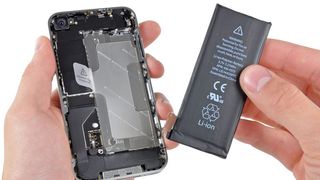With Samsung Poach, Apple Is Finally Taking Batteries Seriously
Apple has poached someone from Samsung to be its global head of battery developments, which could finally mean big improvements for iPhone battery life.
Apple is at last working to advance one of the most overlooked pieces of technology in phones: Batteries. The Cupertino company has hired a big expert from Samsung to head its battery development group, which we can only hope to be as successful as the A series CPU group.

A Bloomberg article claims that Apple has snatched Soonho Ahn from battery maker Samsung SDI Co. as “global head of battery developments.” According to his profile, Ahn worked on “next generation” battery technology as senior VP of Samsung SDI. In the past, Apple has used batteries from the Korean manufacturer.
But why start a new battery development group at Apple now?
There are three answers to this: Qualcomm, the phenomenal success of the A series processors, and the lousy battery situation on Apple’s phones and most smartphones.
Lessening third-party dependency
The legal battle with Qualcomm and its dependency on that company for modems is something Apple wants to avoid on the battery front. When the Cupertino company sued Qualcomm, Apple COO Jeff Williams claimed in court, the latter company barred Apple from access to its 4G LTE modems. And right now Apple can’t jump into the 5G fray because of Qualcomm, as Intel doesn't seem to be ready.
MORE: Smartphones With the Longest Battery Life - A Comparison
Sign up to get the BEST of Tom's Guide direct to your inbox.
Here at Tom’s Guide our expert editors are committed to bringing you the best news, reviews and guides to help you stay informed and ahead of the curve!
Williams said the royalty price is too damn high, adding fire to the FTC accusation that Qualcomm is effectively operating a modem chip monopoly.
Regardless of the result of that lawsuit or the truth in those accusations, the fact is that Apple heavily depends on others. Third parties provide with displays, batteries and other components.
Apple believes it can do everything much better
Which brings us to the second factor to explain this move: Apple’s A series processors have been nothing sort of amazing. The custom processors have been beating everything that other manufacturers throw at it. The A12 Bionic clearly beats the latest Qualcomm Snapdragon, Samsung Exynos, and Huawei Karin. However, benchmark results show that the Snapdragon 855 has dramatically narrowed the gap with the iPhone.
Understandably, this leads Apple to believe that they can do everything better . After all, the processor is the most advanced and complex part in any piece of electronics. So why not develop their own components to make them a lot better than third parties and stop the dependencies?
MORE: 10 Tips to Boost Your iPhone's Battery Life
It makes sense, but it may be harder. Apple bought boutique processor designer firm P.A. Semi in 2008. The company already came with ARM-based designs and tons of expertise, which crystallized in the A series. But this may be hard to repeat, and we may not see meaningful progress for quite a bit of time.
The repeatedly delayed AirPower, Apple’s much touted custom wireless charging technology, shows that creating core technologies from scratch (as opposed to just assembling components) is hard.
The simple need for better batteries
And lastly, but even more importantly, there’s the crappy batteries. I’m not even talking about the batterygate scandal that prompted a worldwide battery replacement program to avoid further PR and legal battles. Or the fact that, despite the more efficient A12 processors, the iPhone XS' battery life is significantly worse compared to other phones with larger battery packs.
Whether it's because of design reasons or safety reasons, Apple uses batteries with less capacity than its competition.
Those are just symptoms of a much larger problem. The battery makers doesn’t seem to be in a hurry to invent the Next Big Thing. What we really need are that pack a lot more power in much tighter volumes, with long operating lives so our phones work fast longer and we don’t have to replace them at a cost for our pockets and the environment.
Apple may be aiming at doing exactly that, creating a unique advantage that they simply don’t have right now.
Jesus Diaz founded the new Sploid for Gawker Media after seven years working at Gizmodo, where he helmed the lost-in-a-bar iPhone 4 story and wrote old angry man rants, among other things. He's a creative director, screenwriter, and producer at The Magic Sauce, and currently writes for Fast Company and Tom's Guide.
